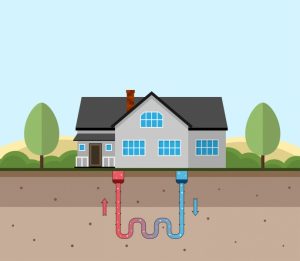The heating radiator was invented in 1835. A century later, forced-air furnaces that burned coal were created. Central air conditioning started to rise to popularity in the 1950s, and heat pumps have been getting more common in recent decades. All these systems are probably familiar to you.
But what about geothermal systems? Many people are unfamiliar with them. We’d like to fix that! The more you know about your home climate control options, the easier it will be for you to choose systems that are ideal for your home and your needs. We’ll introduce you to geothermal heating and cooling systems with an FAQ, but don’t hesitate to reach out if you have questions that aren’t on this list.
How Do Geothermal Heating and Cooling Systems Work?
Though this may seem like a new, exciting “green energy” technology, the first geothermal heating patent was filed in 1912! And the systems used today have some striking similarities to those boilers and radiators from even longer ago: they rely on water to move heat from place to place.
Geothermal heating and cooling systems have a loop of piping that descends into the ground, where temperatures are extremely stable. The pipe is full of water (mixed with antifreeze). If your home is hot, that water will absorb heat from your home and carry it into the earth, where that heat can be released. If your home is cold, that water will absorb heat from the earth and carry it into your home to release it.
Is Geothermal Heating and Cooling Efficient?
The simple answer here is yes! Systems like boilers and furnaces use a lot of energy to create heat from other resources like coal, oil, natural gas, or electricity. But a geothermal system doesn’t have to generate any heat. It simply moves it around, so it is an incredibly efficient heating system.
When it comes to cooling, an air conditioner has to use a lot of energy to force the heat absorbed from your home to dissipate into already hot outdoor air. But your geothermal system is releasing that heat into the earth. In the US, the temperature twelve feet underground is always in the range of 60° or 65°!
Is Geothermal Energy Renewable?
Because these systems depend on the earth’s steady temperature rather than any resources like fossil fuels, geothermal energy is renewable. To keep the water flowing through the loop of piping, a small amount of electricity is used. But because of the spectacular efficiency of these systems, it is a fraction of what other systems consume.
Is Geothermal Heating and Cooling Expensive?
There are two aspects of cost when it comes to heating and cooling systems: there’s the initial investment in the system and the installation, and there’s the operational cost, or how expensive it is to keep the system running. A geothermal system is likely to cost a bit more than if you purchased the cheapest furnace and AC system you could find, but the operational cost is low enough that you can recoup that investment.
If you’d like to learn more about these systems and how you can integrate them into your home, we’d love to chat with you. We provide installation, maintenance, and geothermal repair in Columbia, SC.
Contact Fulmer Heating & Cooling today for a geothermal expert in Columbia, SC!






